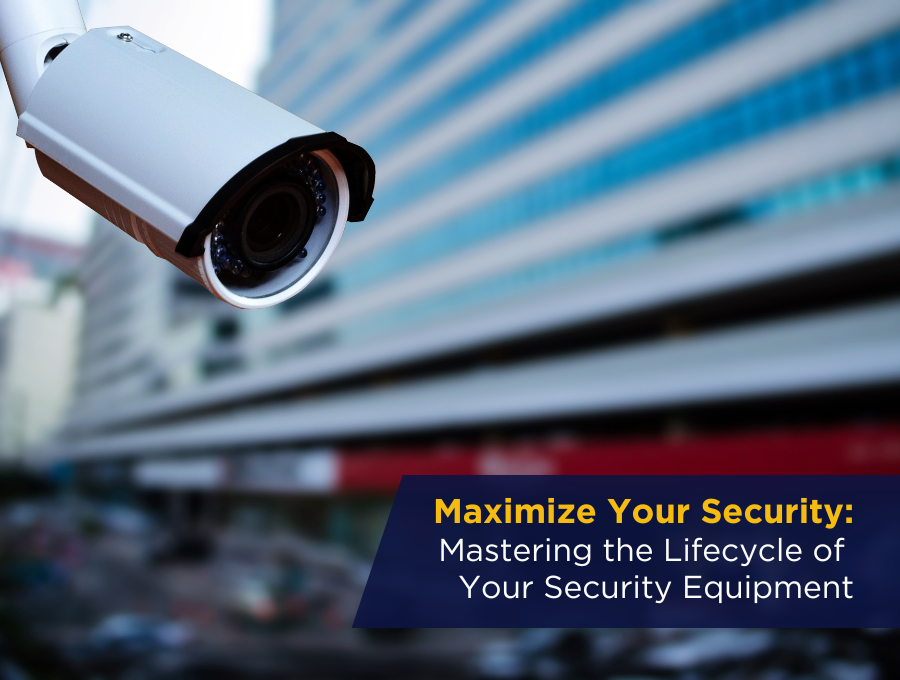What is Security System Lifecycle Management?
Have you ever wondered how long security and fire systems last or when is the best time to consider upgrades? If so, you’re not alone.
In business security, understanding and managing the lifecycle of your security equipment is crucial. Staying ahead with the latest upgrades and replacements not only ensures optimal safety but also maximizes the return on your investment. This article will offer some surprising facts and guide businesses in identifying the ideal times to consider system upgrades or replacements.
Physical security lifecycle management refers to the systematic approach to managing and maintaining the effectiveness of physical security measures within an organization. This concept encompasses the entire lifespan of physical security assets, from initial assessment and design to implementation, maintenance, upgrades, and eventual replacement. The goal is to ensure that the physical security infrastructure remains effective, up-to-date, and aligned with the evolving needs and risks faced by the organization.
Here’s a breakdown of the key stages in physical security lifecycle management:
Assessment and Planning: This initial stage involves assessing the current security needs and risks of the organization. It includes identifying vulnerabilities, evaluating existing security measures, and determining the requirements for new security solutions. This phase often involves risk assessments, site surveys, and consultations with security professionals.
Design and Implementation: Based on the assessment, a tailored security system design is developed. This design should address the identified risks and meet the specific needs of the organization. Implementation involves the installation of physical security measures such as surveillance cameras, access control systems, alarms, barriers, and lighting.
Operation and Maintenance: Once the security systems are in place, they need to be operated and maintained effectively. This includes regular testing, monitoring, and maintenance to ensure that all components of the security system are functioning as intended. It also involves training staff to operate and respond to the security systems appropriately.
Performance Monitoring and Review: Continuous monitoring of the security system’s performance is crucial. This involves regularly reviewing the effectiveness of the system, analyzing security incidents, and gathering feedback. The purpose is to identify any gaps or areas for improvement in the security setup.
Upgrades and Enhancements: As technology advances and the threat landscape evolves, it may become necessary to upgrade existing security systems or implement new measures. This stage involves staying informed about the latest security technologies and best practices and integrating them into the existing security infrastructure.
Decommissioning and Replacement: Finally, when security systems become obsolete, outdated, or no longer fit for purpose, they must be decommissioned and replaced. This process should ensure that the transition to new systems is seamless and does not leave any security gaps.
Why Does Security System Lifecycle Management Matter to Your Business?
Security System Lifecycle Management is crucial for businesses for several reasons, as it directly impacts their overall security posture, compliance, operational efficiency, and financial health. Here’s why it matters:
Ensuring Continuous Protection: The primary purpose of a security system is to protect a business’s assets, employees, and information. Lifecycle management ensures these systems are always operational, up-to-date, and effective against evolving threats, thereby providing continuous protection.
Adaptation to Evolving Threats: Security threats are constantly evolving, and what was a robust system a few years ago may now be inadequate. Regularly reviewing and updating security systems helps businesses stay ahead of these threats.
Compliance with Regulations: Many industries have strict regulations regarding security systems. Lifecycle management ensures that a business’s security infrastructure remains compliant with these evolving regulations, helping avoid legal penalties and reputational damage.
Cost Efficiency: Proper management of the lifecycle of security systems can lead to significant cost savings. Proactively upgrading or maintaining systems can be more cost-effective than reactive measures taken after a security breach or system failure.
Reducing Downtime and Losses: Regular maintenance and timely upgrades can prevent system failures that might lead to operational downtime or security breaches, potentially saving the business from significant financial losses.
Data Protection: With the increasing importance of data privacy, having up-to-date security systems is essential to protect sensitive information from breaches, which can have severe legal and financial repercussions.
Insurance Premiums: Businesses with well-managed, up-to-date security systems may benefit from lower insurance premiums, as they are seen as lower-risk by insurers.
Business Continuity and Reputation: Effective lifecycle management of security systems supports business continuity by minimizing the risks of disruptions caused by security incidents. Additionally, it helps maintain the trust and confidence of customers, partners, and stakeholders.
Technological Advancements: As technology advances, new and more efficient security solutions become available. Lifecycle management helps businesses leverage these advancements for better protection and operational efficiency.
Resource Optimization: It allows for better planning and allocation of resources, as businesses can budget for upgrades and maintenance rather than facing unexpected, costly emergency expenditures.
Security System Lifecycle Management is vital for businesses as it directly influences their ability to safeguard assets, comply with regulations, manage costs, protect data, and maintain their reputation and operational continuity in the face of evolving security challenges.
Security First Alarm King | Commercial Security Company Visalia
As a leader in physical security since 1997, Security First Alarm King has proudly served residential and commercial clients throughout Fresno and the Greater San Joaquin Valley with comprehensive electronic security solutions. The company is 100% employee-owned, and every team member has a vested interest in providing the highest level of commitment to the customer. For more information about commercial or residential security, call 559-734-7761.


